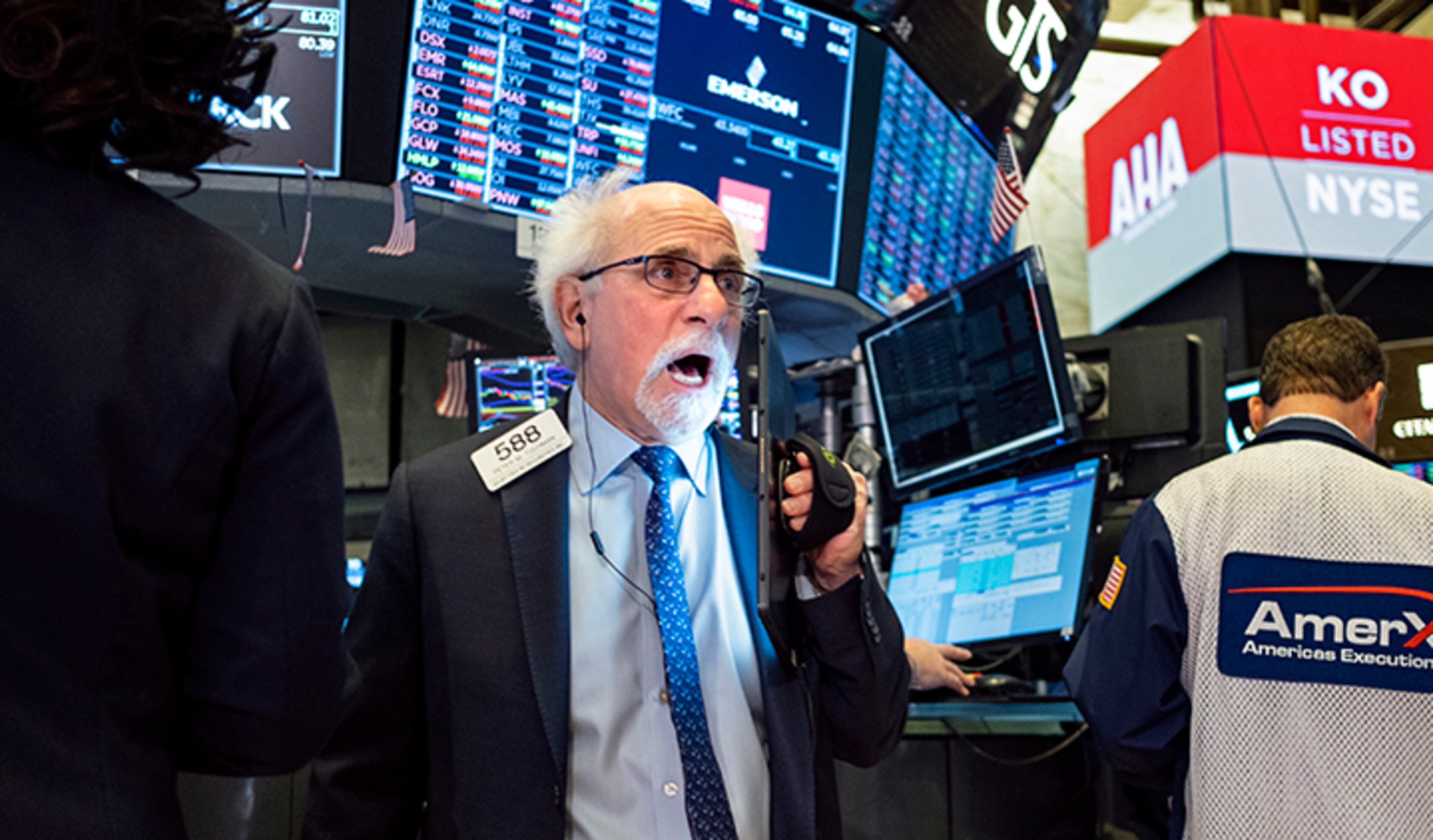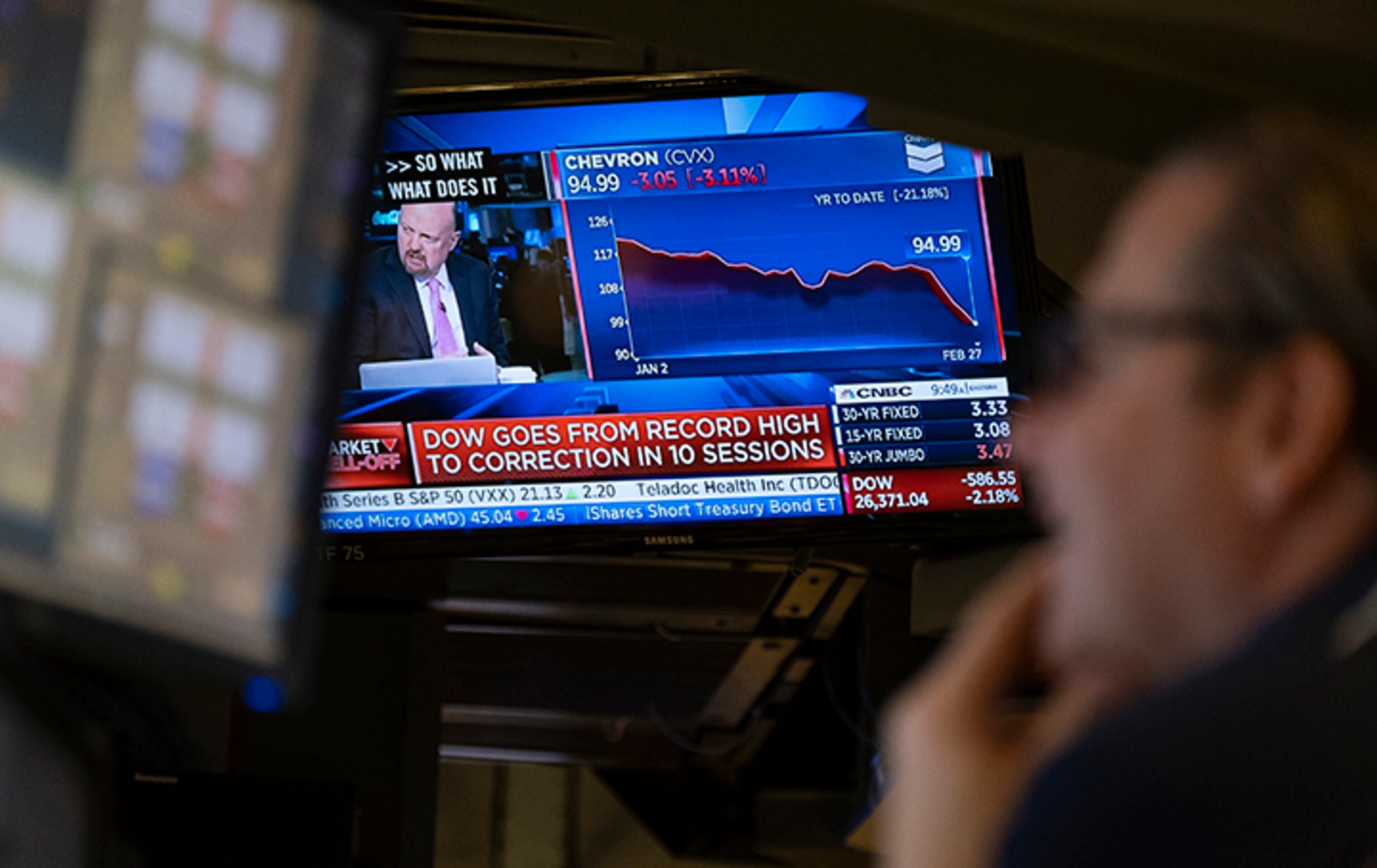Stocks continue nosedive | Dow sinks another 1,190 points amid coronavirus
The Dow Jones Industrial Average sank nearly 1,200 points Thursday, deepening a week-long global market rout caused by worries that the coronavirus outbreak will wreak havoc on the global economy.
Bond prices soared again as investors sought safe places to park money, sending the yield on the 10-year Treasury to another record low. More companies including Microsoft are warning their results will be hurt. The S&P 500 is headed for its worst week since October 2008.
The Dow dove 1,190.95 points, or 4.4%, to 25,766.64. The Nasdaq dropped 414.29 points, or 4.6%, to 8,566.48. The Russell 2000 index of smaller company stocks lost 54.89 points, or 3.5%, to 1,497.87.
"People can demand things that feel safe for irrational amounts of time," said Katy Kaminski, chief research strategist at AlphaSimplex Group. "It doesn't matter, the fundamentals, when people are worried."
The latest losses extended a slide in stocks that has wiped out the solid gains the major indexes had posted early this year.
The S&P 500 is now 12% below the all-time high it set just a week ago. This is now the stock market’s worst week since October 2008, when Wall Street was mired in the financial crisis.
Investors came into 2020 feeling confident that the Federal Reserve would keep interest rates at low levels and the U.S.-China trade war posed less of a threat to company profits after the two sides reached a preliminary agreement in January. The virus outbreak has upended that rosy scenario as economists lower their expectations for economic growth and companies warn of a hit to their business.
Here’s what “correction” means in stock market lingo. https://t.co/jdT5L3Q6rD
— Christine Romans (@ChristineRomans) February 27, 2020
The S&P 500 index's sharp decline from its last record high puts it in what market watchers call a “correction,” a normal phenomenon that analysts have said was long overdue in this bull market, which is the longest in history.
Fastest correction in S&P history: correction we have seen in stock market over past 6 trading sessions is fastest 10% decline in S&P500 from a record high, DB says. Speed of the decline over the past week even beats Black Monday episode in Oct1987, where the peak was in Aug1987. pic.twitter.com/Y1SLjnaHkk
— Holger Zschaepitz (@Schuldensuehner) February 27, 2020
Microsoft warned that the virus outbreak had interrupted its supply lines and would hurt its financial performance, following a similar warning last week from Apple. The two stocks led another sell-off among technology companies. Energy stocks fell sharply as the price of oil dropped 3.4%.
“This is a market that’s being driven completely by fear,” said Elaine Stokes, portfolio manager at Loomis Sayles, with market movements following the classic characteristics of a fear trade: stocks are down, commodities are down and bonds are up.
Stokes said the swoon reminded her of the market’s reaction following the Sept. 11, 2001 terrorist attacks.
“Eventually we’re going to get to a place where this fear, it’s something that we get used to living with, the same way we got used to living with the threat of living with terrorism,” she said. “But right now, people don’t know how or when we’re going to get there, and what people do in that situation is to retrench."
At their heart, stock prices rise and fall with the profits that companies make. And Wall Street’s expectations for profit growth are sliding away. Apple and Microsoft, two of the world’s biggest companies, have already said their sales this quarter will feel the economic effects of the virus.
Goldman Sachs on Thursday said earnings for companies in the S&P 500 index might not grow at all this year, after predicting earlier that they would grow 5.5%. Strategist David Kostin also cut his growth forecast for earnings next year.
Besides a sharply weaker Chinese economy in the first quarter of this year, he sees lower demand for U.S. exporters, disruptions to supply chains and general uncertainty eating away at earnings growth.
Such cuts are even more impactful now because stocks are already trading at high levels relative to their earnings, raising the risk. Before the virus worries exploded, investors had been pushing stocks higher on expectations that strong profit growth was set to resume for companies.
The S&P 500 was recently trading at its most expensive level, relative to its expected earnings per share, since the dot-com bubble was deflating in 2002, according to FactSet. If profit growth doesn’t ramp up this year, that makes a highly priced stock market even more vulnerable.

Goldman Sach’s Kostin said the S&P 500 could fall to 2,900 in the near term, which would be a nearly 7% drop from Wednesday’s close, before rebounding to 3,400 by the end of the year.
Traders are growing increasingly certain that the Federal Reserve will be forced to cut interest rates to protect the economy, and soon. They’re pricing in a better than two-in-three probability of a cut at the Fed’s next meeting in March. Just a day before, they were calling for only a one-in-three chance.
A handful of companies have managed to gain ground in the latest rout of stocks. Medical teleconferencing company Teladoc surged 15.7% and 3M, which counts surgical masks among its many products, rose 0.8%.
The market's sharp drop this week partly reflects increasing fears among many economists that the U.S. and global economies could take a bigger hit from the coronavirus than they previously thought.

Earlier assumptions that the impact would largely be contained in China and would temporarily disrupt manufacturing supply chains have been overtaken by concerns that as the virus spreads, more people in numerous countries will stay home, either voluntarily or under quarantine. Vacations could be canceled, restaurant meals skipped, and fewer shopping trips taken.
"A global recession is likely if COVID-19 becomes a pandemic, and the odds of that are uncomfortably high and rising with infections surging in Italy and Korea," said Mark Zandi, chief economist at Moody's Analytics.
The market rout will also likely weaken Americans' confidence in the economy, analysts say, even among those who don't own shares. Such volatility can worry people about their own companies and job security. In addition, Americans that do own stocks feel less wealthy. Both of those trends can combine to discourage consumer spending and slow growth.
Low Ratings Fake News MSDNC (Comcast) & @CNN are doing everything possible to make the Caronavirus look as bad as possible, including panicking markets, if possible. Likewise their incompetent Do Nothing Democrat comrades are all talk, no action. USA in great shape! @CDCgov.....
— Donald J. Trump (@realDonaldTrump) February 26, 2020
Trump again absurdly blames a stock market slide that mostly happened Monday on a Democratic debate that took place Tuesday night pic.twitter.com/TtRcU9moLZ
— Aaron Rupar (@atrupar) February 27, 2020
— This is a developing story. Please return to AJC.com for updates.

